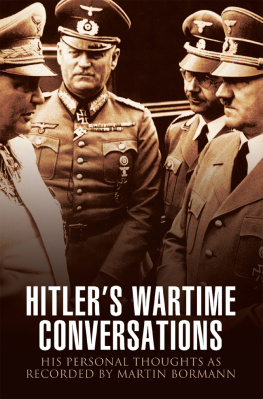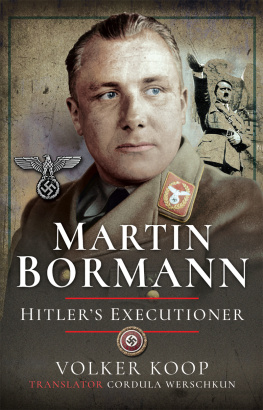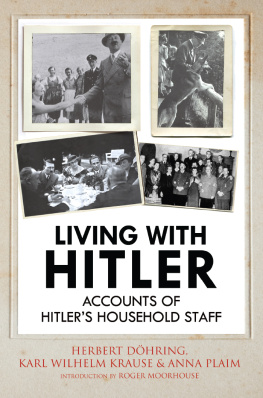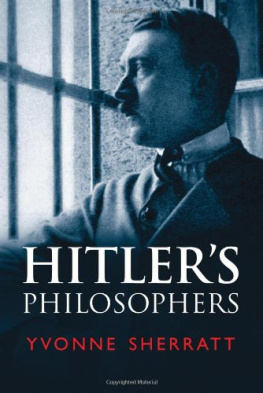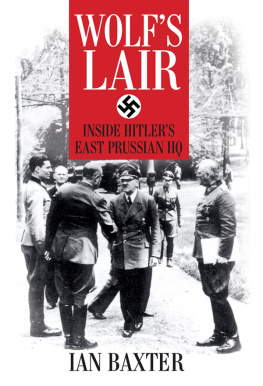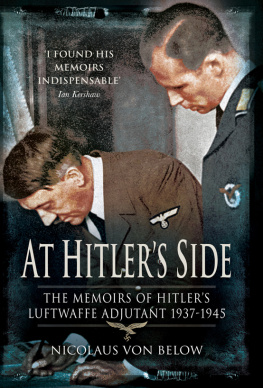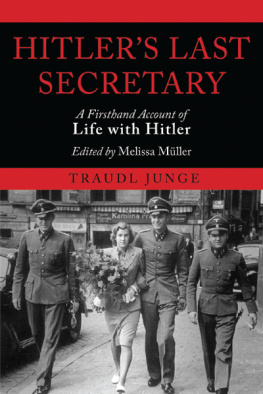HITLERS WARTIME CONVERSATIONS
HITLERS WARTIME CONVERSATIONS
HIS PERSONAL THOUGHTS AS RECORDED BY MARTIN BORMANN
EDITED AND INTRODUCED BY
BOB CARRUTHERS
This edition published in 2018 by
Pen & Sword Military
An imprint of
Pen & Sword Books Ltd
47 Church Street
Barnsley
South Yorkshire
S70 2AS
Copyright Coda Books Ltd.
Published under licence by Pen & Sword Books Ltd.
ISBN: 9781473868885
eISBN: 9781473868908
Mobi ISBN: 9781473868892
A CIP catalogue record for this book is available from the British Library.
All rights reserved. No part of this book may be reproduced or transmitted in any form or by any means, electronic or mechanical including photocopying, recording or by any information storage and retrieval system, without permission from the Publisher in writing.
Pen & Sword Books Ltd incorporates the imprints of Pen & Sword Aviation, Pen & Sword Family History, Pen & Sword Maritime, Pen & Sword Military, Pen & Sword Discovery, Pen & Sword Politics, Pen & Sword Atlas, Pen & Sword Archaeology, Wharncliffe Local History, Wharncliffe True Crime, Wharncliffe Transport, Pen & Sword Select, Pen & Sword Military Classics, Leo Cooper, The Praetorian Press, Claymore Press, Remember When, Seaforth Publishing and Frontline Publishing
For a complete list of Pen & Sword titles please contact
PEN & SWORD BOOKS LIMITED
47 Church Street, Barnsley, South Yorkshire, S70 2AS, England
E-mail:
Website: www.pen-and-sword.co.uk
CONTENTS
INTRODUCTION
Adolf Hitler looms large over the history of the 20 th Century. With his extraordinary skills of leadership, communication and presentation, coupled with all the resources of a modern media, he transformed German society from an economic disaster into a uniform, ordered, and disciplined powerhouse.
Hitler also unleashed a world war and a state controlled programme of genocide. In the process he destroyed the reputation of his beloved nation and ushered in the Cold War era. Hitlers actions touched the lives of hundreds of millions, and even today echoes of Hitlers legacy can be experienced all over the globe.
It is no surprise therefore that both scholars and the general public have an enduring interest in this fascinating individual, yet despite all that has been written about Adolf Hitler we know comparatively little about the man.
In our search to understand more about Hitler the man, we have at our disposal the transcripts of Hitlers speeches, writings, letters and directives. However, even a cursory reading of Mein Kampf reveals a man who had no coherent means of expression. His rambling and impenetrable thoughts on economics and political theory are so astonishingly inept that even his own inner circle were privately dismissive of his meisterwerk. Gring famously confessed to never having read it.
It is all too easy to write Hitler off as a crazed tyrant who somehow got lucky. This enigmatic individual undoubtedly possessed charisma, guile, organisational vision, oratory skills, animal cunning and a masterful grasp of the art of political manoeuvring that allowed him to seize the zeitgeist to enthuse, mobilise, and control a huge country.
From 1942, Hitler insisted that a stenographic record be taken of his military conferences, although only portions of that record survived the effort to destroy them all at the end of the war. General Franz Halder, the German armys Chief of Staff from 1938 to 1942, kept a diary for most of those years that includes important reports on his meetings with Hitler, and this diary has been published. Despite this, it is frustrating for historians that there are no surviving records of Hitlers conversations with Hermann Gring, the commander of the German air force. However, Admirals Erich Raeder and Karl Dnitz, the commanders-in-chief of the German navy during World War II, had records made of their meetings with Hitler. There are also, of course, many other accounts of conversations with Hitler including contemporary accounts of Goebbels conversations with Hitler in the diary of the propaganda minister. Fortunately for posterity extensive fragments of his private conversations with his military and political advisors, as well as his personal entourage have survived the wreck of history.
Following his evening meal Hitler was in the habit of launching into long rambling monologues and some transcripts of those conversations endure. The transcripts were created on the orders of Martin Bormann who acted as Hitlers personal secretary from 12 April 1943 to 30 April 1945. Bormann considered every utterance of Hitlers to be of vital importance and he persuaded Hitler to permit a record to be made. Subsequently, wartime circumstances conspired to almost destroy all evidence of the conversations, however, some of those who prepared the records secretly retained copies. In 1951, several typed German accounts of Hitlers table talk surfaced in the Manuscripts Division of the Library of Congress and were included with other Hitler materials designated as the Adolf Hitler Collection. In consequence, in 1951, a collection of records of Hitlers private conversations in the circle of his associates was finally published.
These conversations are known as Hitlers Table Talk and form a very important historical document, known in Germany as the Bormann-Vermerke. This fragmentary collection is the official record of Hitlers table talk that begins at the height of his success, in the first year of his war of aggression against Russia.
In the summer of 1941, Hitler had total victory in sight and he looked forward to the realisation of all the ambitious plans he had set out in Mein Kampf. Bormann was with Hitler in the fortified Fhrerhauptquartiere in East Prussia and Ukraine, and he made it his job to ensure that Hitlers musings were recorded. Responsibility for making this record and ensuring its accuracy was entrusted to Heinrich Heim, an experienced Party official on Bormanns personal staff who was also a lawyer with the rank of Ministerialrat.
Unfortunately, a note of caution must be sounded when approaching the first German edition. The 1951 edition, although sourced from the German texts and edited by renowned historian Gerhard Ritter, did not follow the historical chronology and was instead organised by topic. Years later when the full texts were finally published many glaring omissions were evident, despite there being no original indication of the drastic surgery which had been carried out on the source transcripts.
Numerous German editions followed the Ritter debacle however there was now the added difficulty that much of the German source material had fallen into the hands of Franois Genoud, a Swiss lawyer and private banker who resided in Lausanne. Genoud was a great admirer and enthusiastic supporter of the Nazis and he published a French translation of the texts available to him.
Finally, in 1980, there appeared at last the German text of the Bormann-Vermerke under the title Adolf Hitler: Monologe im Fhrerhauptquartier , which is the German original of this book. The English text of the table-talk that originally appeared in 1953, and is reprinted here is a translation of the French edition and is not taken from one of the fragmented German texts.
The text of this book has a long and tangled history. Heim began his record taking duties on 5 July 1941. It was kept regularly for over eight months; but in mid March 1942, Heim was seconded for other duties, and for the next four months his duties as recorder of the Table Talk were assigned to a deputy, Dr. Henry Picker. Both Heim and Picker were sound Party members, personally known to Hitler and there is little doubt that the records are accurate.
Next page

![Traudl Junge - Hitler's Last Secretary: A Firsthand Account of Life with Hitler [aka Until the Final Hour]](/uploads/posts/book/858776/thumbs/traudl-junge-hitler-s-last-secretary-a.jpg)
